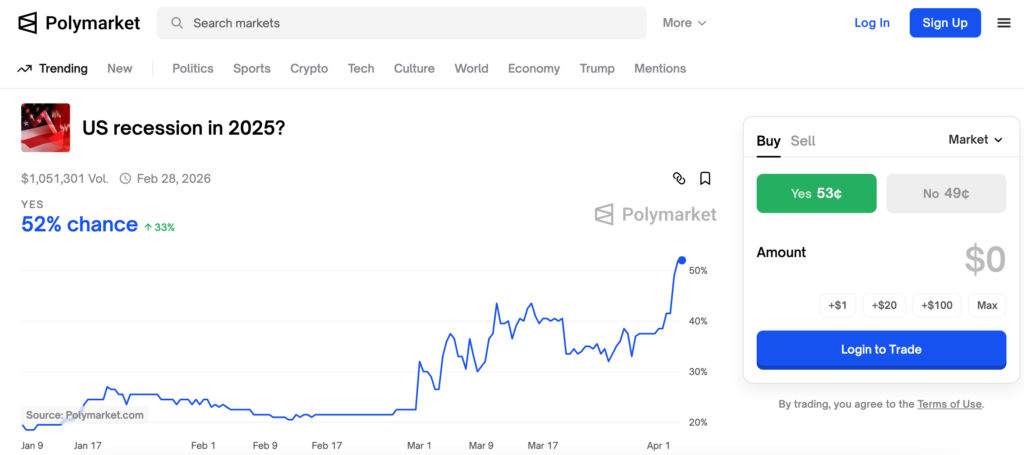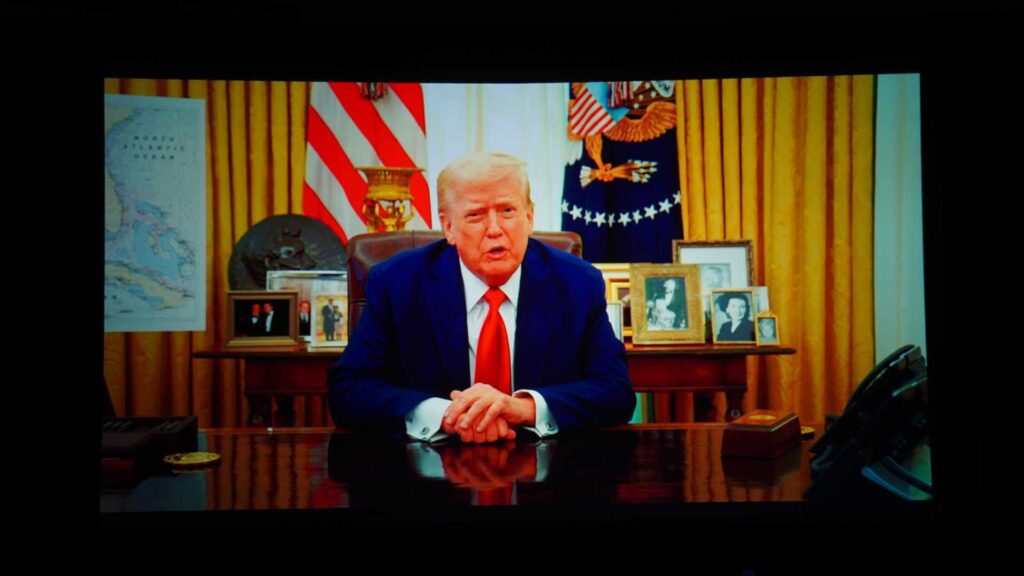As concerns about a potential recession in the United States mount, driven by President Donald Trump’s recent tariff plans, prediction markets are reflecting heightened anxiety regarding the economy’s future. Platforms like Polymarket and Kalshi are indicating that traders are increasingly worried about a downturn.
Rising Odds of a Recession
On Polymarket, a decentralized prediction platform, the likelihood of the U.S. entering a recession this year has surged past the 50% mark for the first time since the trading for the “US Recession in 2025” contract began earlier this year. Within a mere 24 hours, the shares for a “Yes” outcome jumped from 39 cents to over 50 cents. The contract stipulates that it will resolve in the affirmative if the National Bureau of Economic Research (NBER) confirms a recession at any point before December 31. Additionally, this will require two consecutive quarters of negative gross domestic product (GDP) growth.
Similarly, Kalshi, a regulated U.S. prediction market, has reported an increase in recession concerns, with the probability of a recession occurring by 2025 climbing to 54%, up from 40%. These shifts in prediction markets reflect a growing sentiment among traders that economic challenges are on the horizon.
Impact on Financial Markets and Bitcoin
Financial markets, which are typically forward-looking, may respond to these increasing recession odds by driving down risk assets, including Bitcoin (BTC) and other cryptocurrencies. At the time of writing, S&P 500 futures were down 3%, indicating a significant risk aversion on Wall Street. Bitcoin was trading at $83,100, reflecting a 1.5% decline over the past 24 hours.
The tariffs announced on Wednesday implement a base rate of 10% on all imports, along with higher taxes on 60 countries deemed the worst offenders. China, the country most affected, faces a staggering 34% tariff in addition to the existing 20%, bringing the total to 54%. The base tariffs will take effect on April 5, while the increased reciprocal rates will kick in on April 9.
While the Trump administration anticipates that these tariffs will help address the ongoing U.S. goods trade deficits, they may also contribute to domestic inflation and global economic instability in the short term. A potential backlash from China, the European Union, and other nations could escalate tensions, sparking an all-out global trade war.
Short-Lived Risk Aversion?
Despite these looming uncertainties, some analysts contend that the tariff-related anxiety may only result in an economic slowdown, rather than a full-blown recession. UBS recently stated in a blog post, “The threat of further tariff escalation remains a key concern, but our economic forecasts do not predict a recession in the U.S. In our base case scenario, a variety of selective tariffs and counteractions are likely to slow economic growth compared to last year, but they should not prevent the U.S. economy from expanding by around 2%—its historical trend rate—this year.”
Market analysts also suggest that the initial risk-off sentiment could be short-lived, potentially reversed by expectations of interest rate cuts from the Federal Reserve. Joseph Wang, the operator of the research portal fedguy.com, pointed out on social media that “tariffs are dovish, and big tariffs are very dovish.” He elaborated that while tariffs may create inflationary pressures, these can be offset through foreign exchange rates and are ultimately temporary. However, he cautioned that damage to business sentiment could have lasting effects, potentially leading to unemployment, which the Fed would likely seek to avoid.
Traders in the rates market are already adjusting their expectations, factoring in a higher likelihood that the Fed will cut benchmark borrowing costs in June, thereby reigniting the easing cycle that began in September of the previous year.
In conclusion, as the U.S. grapples with tariff-induced uncertainty, the implications for both the economy and cryptocurrency markets, particularly Bitcoin, remain to be seen. The coming weeks will be crucial in determining whether these recession fears will materialize or if the economy can weather the storm.



